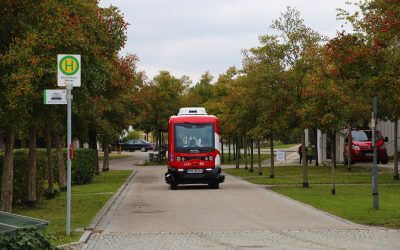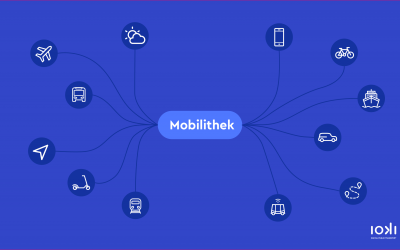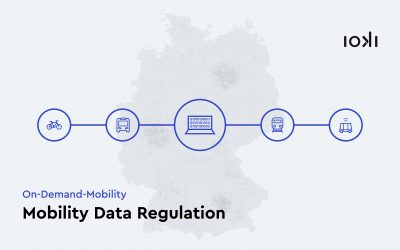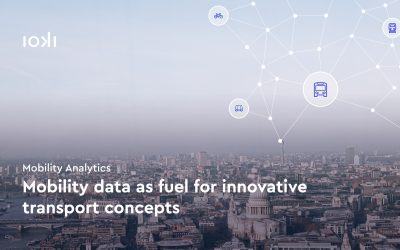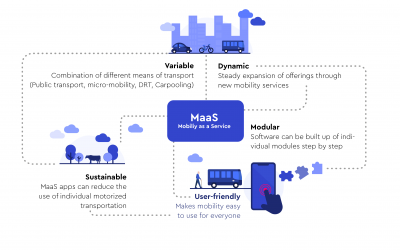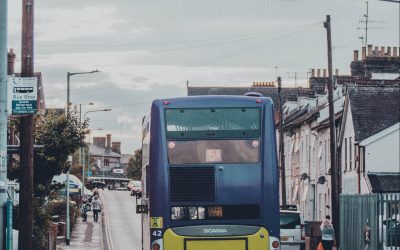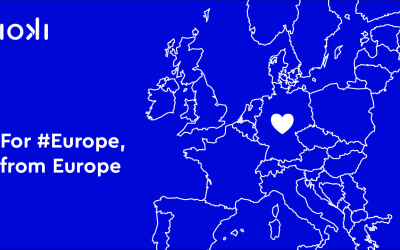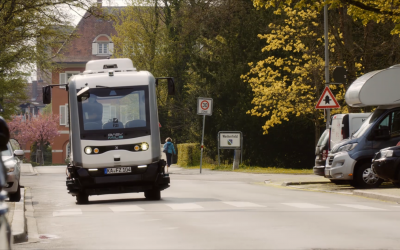When you think of the future of mobility, you see young people racing through skyscraper canyons in futuristic robot taxis in your mind’s eye. In reality, most autonomous projects do not drive sleek robot taxis in German metropolises. Instead, ponderous-looking minibuses, so-called people movers, move through narrow alleys and across marketplaces in smaller towns and rural areas. This is the case in Bad Birnbach, for example. The small town in the Lower Bavarian spa triangle, which is known for its thermal baths, has been attracting not only wellness guests but also fans and experts of new mobility since 2017. The reason for this is a small, box-like vehicle with a top speed of only 15 km/h: it is Germany’s first autonomous public bus!
It’s all about that database – with the Mobilithek all mobility data is in one place
Good news for all those involved in the mobility cosmos: Since July 1, 2022, it has been one for all: one platform for the exchange of all relevant mobility data. This is made possible by the Mobilithek. This new central, uniform and user-friendly access point of the Federal Ministry for Digital and Transport replaces the previous platforms “Mobility Data Marketplace” and “mCLOUD”.
PERSPECTIVES from Hanna Kops
Hanna Kops is Head of Experience at Transport for London. She leads the digital design team which is responsible for the experience strategy, innovation, and design across all digital channels for one of the largest transport systems.
Mobility Data Regulation
Last September, the starting signal was given for the large-scale use of mobility data in transport planning. The Federal Council has agreed on the implementation of the German Mobility Data Regulation. The new regulation makes it possible to make German mobility data available on the so-called Mobility Data Marketplace. For companies from the mobility sector, the new regulation enables access to data sets which were not available before. Through the use of these data sets in the mobility sector, customers will benefit from new, data-driven mobility concepts that are precisely tailored to the actual mobility needs on site.
Mobility data as fuel for innovative transport concepts
The desire for flexible, sustainable and above all contemporary mobility solutions is stronger than ever before. Digitalisation and the associated use of data are driving the further development of exactly these mobility solutions. Complex analytical models make it possible to link data from different sources, evaluate data quantities and obtain results in real time. Mobility and traffic data are thus the fuel for a demand-oriented, automated and above all customer-centric public transport system. But to what extent are digital and data-based applications changing the public transport sector?
Perspectives from Tyll Diebold
Tyll Diebold is a research assistant at the Institute for Transport Planning and Logistics at TU Hamburg. He has provided scientific support for the ioki Hamburg project from the very beginning and recently published the study “On-demand services as a component of public transport”. After completing his Master of Science in “Logistics, Infrastructure and Mobility” at TU Hamburg in 2016, he initially worked for an engineering office for a year before returning to TU Hamburg to complete his doctorate.
Mobility as a Service: full speed ahead towards the mobility turnaround
Whenever we talk about the transport revolution and the associated restructuring of public transport, we cannot avoid the term “Mobility as a Service”, abbreviated MaaS. But what exactly is “MaaS” and how can the digital approach help to sustainably advance the transport revolution?
Digital rail and on-demand rail replacement services
In Germany, up to 125 kilometres of rail are to be modernized by 2025. During the modernization, passengers will have to switch from rail to rail replacement services. This is also the case for passengers on the Stuttgart S-Bahn, while the main line there is being modernized this summer. Nevertheless, this rail replacement service is different, because: On weekends and weekend nights, it is main line offline – S-Bahn On-Demand online.
Great Britain’s Bus Market – Exploiting Potentials, Establishing Innovations
England’s national bus strategy, Bus Back Better, states that around 4.07 billion journeys were made by bus in England in 2019/20. This is more than double the number of journeys made by rail. Whether travelling to work, education or leisure, the bus is the UK’s number one public transport mode. However, not all that glitters is gold here either. Despite the high demand, there is room for improvement in terms of service quality, fares, capacity utilisation and efficiency of bus services. The outstanding fields that need to be tackled are primarily due to the deregulated market for bus services.
The future is green
The 150.7 million customer journeys made by Deutsche Bahn last year show that many people care about travelling sustainable. DB plays a major role in shaping the future of mobility in a climate-friendly way. In order to fulfil this role in line with requirements, our mother concern combines economy, social affairs and ecology aspects with each other.
Digital mobility solutions for Europe from Europe
The mobility transformation in Europe must be driven forward through modern, digital and inner-European platform solutions in order to create a real added mobility value. This added value can only be created through the development of holistic software solutions that enable public authorities and (transport) companies to integrate new forms of mobility across different modes of transport.
All aboard, please! Next stop: autonomous driving
ioki has already achieved a number of milestones in the field of autonomous driving, from test operations on closed terrain to linking an On-Demand-Booking-System with autonomous driving vehicles. In March 2021, the “Law on Autonomous Driving” was presented in the Bundestag, which clearly shows: The topic is gaining more weight not only among mobility designers, but also at the political level. In the bill presented, legal framework conditions were defined for fully automated driving in certain operating areas. In addition, further investments are to be made in research and development in the field to make the mobility of the future safer, more environmentally friendly and, above all, user centered. “Germany will be the first country in the world to bring autonomous vehicles out of the research labs and onto the road,” says Federal Minister Andreas Scheuer – ioki has already been working on this for several years and shows itself to be an innovator making progress here.
Newest article

Digital Mobility on the Move – Insights from the Smart Country Convention 2025
Imagine a city where citizens purchase their bus ticket directly through a service app, book an on-demand shuttle, and effortlessly switch between various modes of transport – without needing additional apps or complex logins. This vision was presented by our colleague Maximilian Rütten and Linus Frank from our partner Vesputi at the Smart Country Convention (SCCON) 2025.

